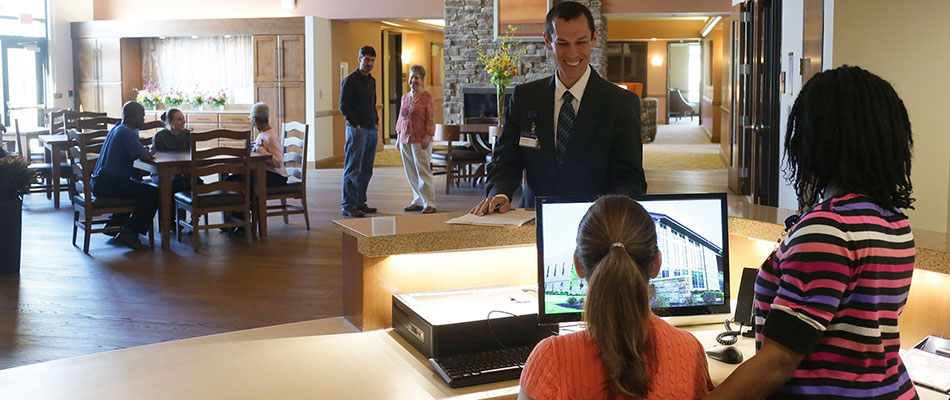Category: Sibcy House

What is Residential Treatment?
A loved one is experiencing mental health problems – or perhaps you are dealing with mental illness yourself. As you look into treatment options – outpatient, inpatient, etc., one option that may be recommended is a residential treatment center.
Residential treatment is a specialized form of inpatient care. It typically includes 24-hour supervision and monitoring within a non-hospital setting, often aimed at providing an intensive therapeutic environment for clients with mental health and/or substance use issues. This type of care provides an extended stay with personalized, clinically informed interventions and services that can often be more beneficial than traditional outpatient care.
Additionally, residential treatment programs can offer a variety of activities designed for both the physical and emotional health of clients, ranging from recreational activities to individual and group therapies. Residential treatment is highly individualized to meet each person’s specific needs, helping them build life skills as they work on their emotional stability and overall well-being.
What is a Residential Treatment Center?
A residential treatment center provides intensive, comprehensive assessment and care for individuals dealing with complex mental health and/or addiction issues.
But is this type of program right for you or your family member? After all, any type of treatment approach isn’t right for everyone. Consider the following information before you make a decision about whether residential treatment is the best choice.
Who Is the Best Candidate for Residential Treatment?
While a variety of individuals can benefit from the structured and supportive environment of a residential treatment center, some of the best candidates are those who:
- Have complex diagnostic or treatment issues;
- Need a more structured environment or do not have a natural environment ideal for supporting their treatment;
- Have not responded sufficiently to previous treatments;
- May have a higher risk of decompensation. (While stable, they may need a greater degree of watchful oversight to address potential suicidal risk, “acting out” behaviors, etc.).
When is Residential Treatment Center Necessary?
Residential treatment centers can be an important lifeline for those struggling with mental or emotional health issues and are in need of additional support for wellness. These establishments, providing short-term 24-hour care and a safe environment, often benefit those at risk of self-harm or suicide as well as those with severe emotional trauma that can’t be handled without a structured program.
It is often recommended to individuals when more traditional treatments such as therapy or medication have not been successful. A residential treatment center can also act as a bridge to prevent the person from having to go into a higher level of care such as hospitalization or long-term into the institution if their mental health condition worsens.
If you believe that you or someone you know might need residential treatment assistance, contact your healthcare provider who is best suited to assess the current level of care needed and guide you through this process.
What is Residential Treatment Like?
For an individual who meets one or more of the above criteria, a residential treatment center can provide many benefits, such as the following:
- A supportive environment. The community and therapeutic milieu provided in a residential treatment environment can be treatment approach themselves. Many individuals with mental illness do not live in a naturally supportive environment and may easily become socially isolated or frustrated after an acute treatment episode. Others lack the life skills necessary to function productively, and the therapeutic environment of a residential program provides a safe place to learn and practice them. It helps foster more responsible behavior, greater self-esteem, and positive relationships.
- A greater degree of structure. Residential treatment centers provide structured and stabilizing routines throughout the entire day. These can be beneficial to individuals with impulsivity, compliance issues, medical problems, or high-risk behaviors.
- More intensive, longer-term care. If a behavioral health problem is particularly severe or complex, outpatient treatment is not sufficiently intensive, and inpatient treatment is not long enough to help patients develop new coping and social skills. Ten- or 28-day programs are an increasingly popular option in many residential treatment centers today.
- More extensive diagnostic assessment process and tools. An estimated 85% of individuals with addiction are also dealing with a mental illness. Additionally, individuals with one type of mental disorder may also have other mental health issues. Proper assessment and diagnosis is important to guide the best treatment plan possible. Residential treatment programs typically provide more extensive assessment, often using sophisticated tools and technologies such as psychological tests, brain scans, and even genetic testing. Find out more about psychological assessments here.
- Broader range of treatments. A residential treatment center typically offers a broader “menu” of services than other settings. Once assessment is completed, residential program offer a robust selection of therapies, from traditional psychotherapy to recreational therapy. The fact that the environment is more structured and supervised makes some treatments, such as medication adjustments, more feasible. The logistics of obtaining therapeutic assessment and high-tech treatments are also easier when services are provided literally under one roof. Finally, this environment is also ideal for implementing detailed protocols for specific disorders, such as obsessive-compulsive, substance abuse, and eating disorders.
There are many benefits to residential treatment. One way to remember the overall benefits is to think of the “4-S” approach to treatment: Supportive, Structured, Safe, and Sophisticated.
Alternative Options to Residential Treatment
Residential treatment is not appropriate for everyone. Patients with short-term or milder disorders may benefit sufficiently from outpatient treatment, while individuals with critically acute problems or significant suicidal risk may need inpatient care.
But for many individuals, the “happy medium” provided by an effective residential treatment center offers the best head start on regaining a productive and enjoyable life. For more information about residential mental health and addiction treatment, view our in-depth guide.


